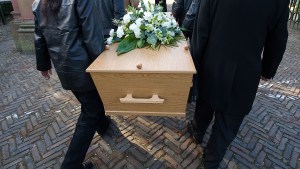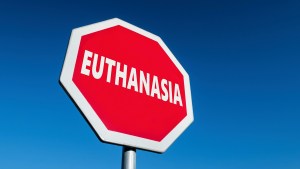In the midst of the hustle and bustle of news that disperses and confuses us, comes the proposal of a French law that no one dares to call by its name. Its supporters modestly refer to it as the “end of life” law. The head of state announced it as a “humanistic” text last March. In the end, the project is being revealed for what it is, thanks to the parliamentary debate that has just begun: a law opening the door to both euthanasia and assisted suicide. That is cause for serious concern.
Facing the trial of suffering
The unanimous opinion of the heads of department and nursing staff involved in palliative care is that barely 3% of patients who receive their care explicitly ask to die. This falls to 0.3% after a few days, when the treatments and the immense humanity they receive soothe their anguish. And often the figure drops to zero.
“Patients suffering from [amyotrophic lateral sclerosis], for example, have become the archetype of those waiting for such a law,” a woman in charge of one of these departments for 30 years recently told me. “In fact, many patients are furious at being dragged into this kind of debate, as if they had to rally around a few cases that have been given media coverage because they’re famous. As if having this disease makes it compulsory to want to die.”
The people who want to die are the ones who have the feeling of being nothing to anyone, and who are anxious about becoming a burden, a cost for society, for their descendants.
It’s not implausible to want to die when faced with the ordeal of physical or psychological suffering. Even less so when society is constantly pointing out the cost of your care and the resources deployed to support you. Even less so when you find yourself isolated in institutions where no one comes to see you, and where life no longer seems to have any meaning … What is unbelievable is that the only response to this anguish is a fatal injection.
Endangering the weakest
A pain-ridden old man in the solitude of his nursing home, an incurably ill person whom people have tired of visiting, an elderly person whose heirs are waiting for their inheritance … The people who want to die are the ones who have the feeling of being nothing to anyone, and who are anxious about becoming a burden, a cost for society, for their descendants.
This “end of life” law is the fruit of lobbies, not doctors. It was drafted and discussed by healthy, wealthy, and happy people.

Supported by a performance-driven society, they intellectually refuse to imagine themselves as dependent, since they think they can decide everything. They are debating a law that will enable the poor to die more quickly, while believing themselves and their loved ones to be spared this risk — but perhaps they are mistaken in the end.
In the short to medium term, this law jeopardizes the safety of the elderly who are no longer able to communicate and who will be seen as a drain on public finances. It endangers the injured and the sick who, in their prime of health, may have expressed the wish to be euthanized, but who will no longer be able to turn back because they’re unable to communicate. It weakens the position of depressed people who, as in Belgium, will be able to request assisted suicide on the grounds of “unbearable psychological suffering,” like the survivor of the Brussels attacks, Shanti de Corte, in 2022.
How should we react?
Some will reply that there’s no question of going that far, that it will never happen. They lie. Perhaps in good faith. But every time, it’s the same thing, with the same refrain. And each time it goes further: because those doors never close and never stay half-open for long. They can’t resist the wind that blows through them, which is then called a breath of freedom, but is really just a powerful, nasty draught that sickens the whole social body.
This law is a response to individual demands, accelerating the decomposition of a society that has become nothing more than a group of capricious individuals who demand that the state treat them like only children, while claiming the freedom of adults.
It’s reassuring that members of parliament from different parties are able to express their dismay at what’s happening. It’s all the more distressing to see the intellectual spinelessness of the rest, who, not daring to oppose, silently rally behind the cause.
The question is, how should we react?
No doubt we need to pray and work so that Christ’s disciples, in this decomposition that is taking place, can be prophets of the non-negotiable dignity of all human life and know how to find ways to manifest this concretely, rather than sticking to rhetoric and moaning. It’s up to us to propose and develop, in this rather sinister atmosphere, signs that the Kingdom is here: I was sick, you visited me; I was a stranger, you welcomed me; I was hungry and thirsty, and you gave me food and drink …





